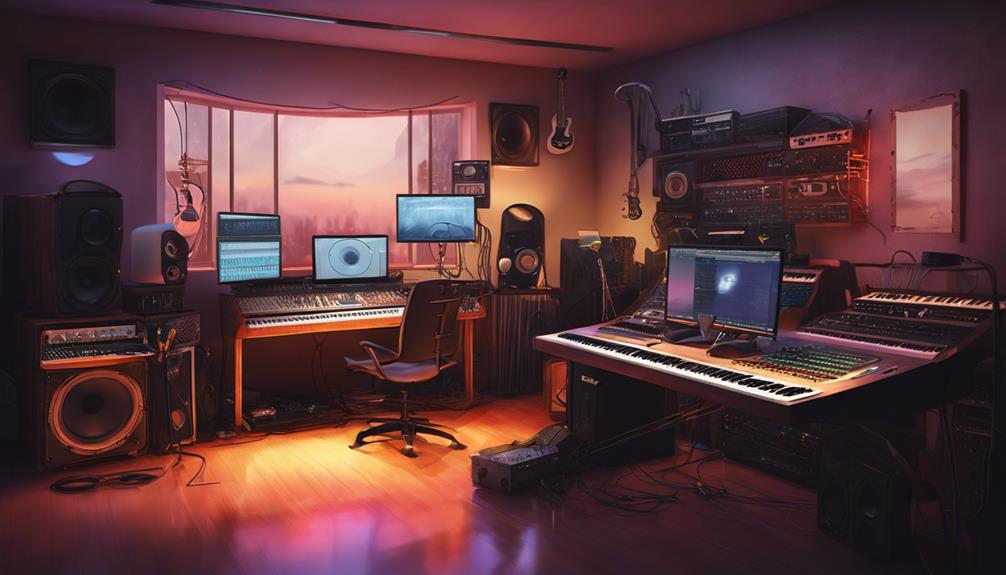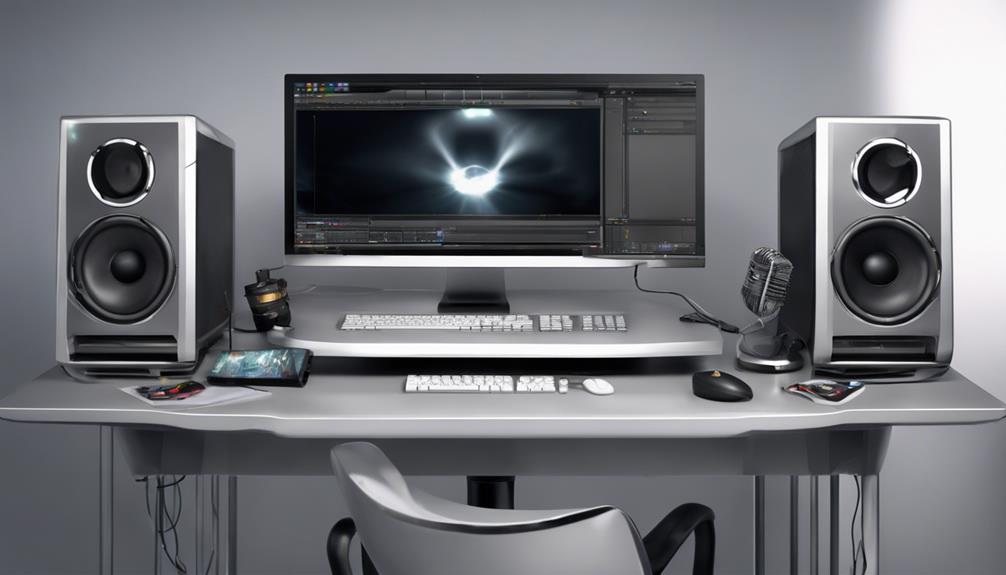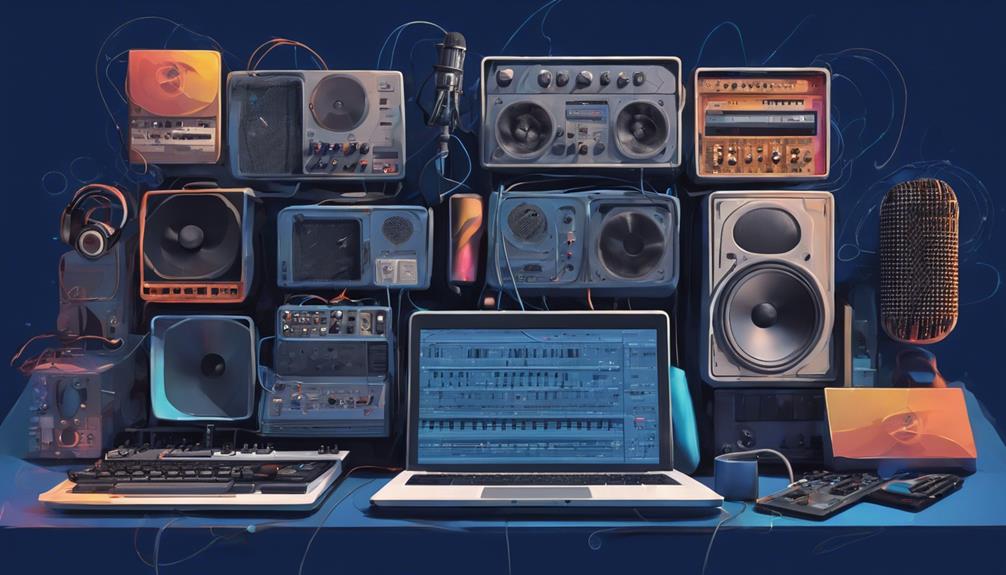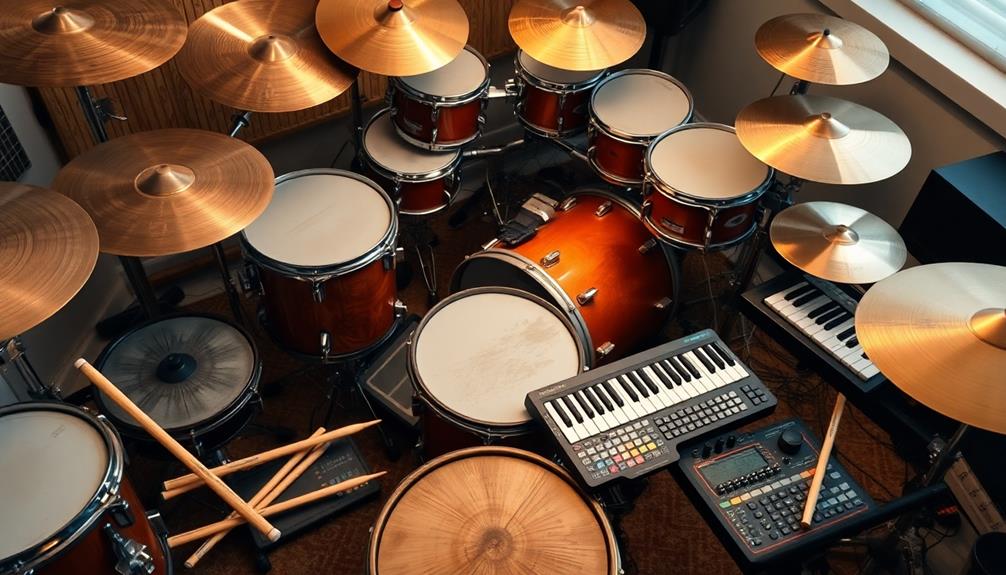As a music producer, I've found that choosing the right Linux OS is essential to unleashing my creative potential. With so many options available, it can be overwhelming. That's why I've narrowed it down to the most important factors to take into account. From audio latency concerns to file format compatibility, I've got it covered. I've also explored high-quality software and tools like Audacity, AKAI Professional MPD218, and Music Theory for Computer Musicians. With the right Linux OS, I can guarantee high-quality audio and seamless integration with my hardware. If I want to take my music production to the next level, I need to find the perfect OS – and I'm about to discover which ones make the cut. After extensive research, I’ve come to appreciate how some Linux-based systems are optimized for audio production, offering real-time kernels and low-latency performance that rival even the best macOS versions for musicians. While macOS has its strengths with built-in audio tools and universal support, Linux provides unparalleled flexibility and customization for those willing to experiment. With the right setup, Linux becomes a powerhouse for music creation, giving me the freedom to craft my sound without boundaries. Additionally, the open-source nature of Linux allows me to tailor my environment specifically to my workflow, ensuring that every tool and setting is optimized for peak performance. While exploring these systems, I couldn’t help but compare them to the best macOS versions for musicians, which excel in simplicity but often lack the customization options I crave. With Linux, I get the best of both worlds—professional-grade performance and the freedom to innovate without being locked into a single ecosystem.
Key Takeaways
- Linux distributions like Ubuntu Studio offer optimized audio production settings for low audio latency and real-time kernel support.
- File format compatibility is crucial, with support for industry-standard DAW software formats, MIDI files, and VST plugins.
- A user-friendly music production software like Audacity Professional Pro Audio Music Recording Editing Software can enhance creativity.
- A MIDI controller like AKAI Professional MPD218 USB MIDI Controller can provide versatility and portability for music production.
- Understanding music theory fundamentals through resources like Music Theory for Computer Musicians can improve music production skills.
Audacity Professional Pro Audio Music Recording Editing Software

As a music producer, I can attest that Audacity's ability to record from any audio source, support various formats, and restore vinyl records and tapes makes it an ideal choice for those who want a professional-grade recording and editing software without breaking the bank.
With its user-friendly interface, I can easily copy, cut, and paste recordings, adding special effects like echo and noise reduction to give my tracks a polished sound. The software also allows me to trim silence, fade in/out, and adjust volume levels, giving me complete control over my audio files.
Whether I'm working with live audio or digitized recordings, Audacity's flexibility and functionality make it an indispensable tool in my music production workflow.
Best For: Musicians, music producers, and audio enthusiasts who want a professional-grade recording and editing software without breaking the bank.
Pros:
- User-friendly interface for easy recording and editing of audio files
- Supports various audio formats and allows for flexible editing options
- Free open-source software available for download from the web
Cons:
- Some customers have reported issues with non-loading disks and residue on discs
- Mixed feedback on functionality and usability
- Limited customer support due to its open-source nature
AKAI Professional MPD218 USB MIDI Controller

For music producers seeking a thorough, versatile MIDI controller that integrates seamlessly with their Linux OS, the AKAI Professional MPD218 USB MIDI Controller is an excellent choice, offering 16 MPC drum pads and 6 assignable knobs to enhance their creative workflow.
As a user, I appreciate the ultra-portable design, which makes it easy to take with me to any recording session or gig. The controller's extensive software suite, including Ableton Live Lite and Drum Synth 500, provides a solid foundation for music production.
I've found the navigation of notes to be slightly confusing at times, but the overall build quality and ease of setup make up for this minor drawback. With its expandable 48 assignable pads across three pad banks, this controller is ideal for beat production, triggering drums, samples, and effects, and recording and automation tasks.
Best For: Music producers, beat makers, and musicians who need a portable and versatile MIDI controller for music production, live performances, and recording sessions.
Pros:
- Ultra-portable design with 16 MPC drum pads and 6 assignable knobs for enhanced creativity and control
- Comprehensive software suite included, featuring Ableton Live Lite and Drum Synth 500, providing a solid foundation for music production
- Expandable with 48 assignable pads across three pad banks, making it ideal for beat production, triggering drums, samples, and effects, and recording and automation tasks
Cons:
- Navigation of notes can be slightly confusing for some users
- Some users experience issues with velocity control and ghost notes on the pads
- May require additional setup and customization for optimal performance
Music Theory for Computer Musicians

When it comes to music production on Linux, having a solid grasp of music theory is essential, and 'Music Theory for Computer Musicians' by Michael Hewitt is an invaluable resource that helps bridge the gap between traditional music notation and computer-based music production. This book presents music theory concepts in a practical and accessible way, using examples from music software programs like Reason, which makes it easy to understand and apply the concepts to my music production workflow.
I appreciate how the book emphasizes the importance of understanding music theory fundamentals for aspiring music producers and computer musicians, as it has helped me improve my songwriting and compositional techniques.
The inclusion of quizzes at the end of each chapter has been particularly helpful in reinforcing key points, and I've found the exercises in the book to be beneficial for enhancing my understanding of music theory. By engaging with the exercises and examples provided, I've gained a better grasp of music theory concepts, which has ultimately improved my music production skills.
I highly recommend 'Music Theory for Computer Musicians' to anyone looking to enhance their craft of songwriting and music production, as it provides a solid foundation for further learning and has been instrumental in filling gaps in my music theory knowledge.
Best For: Aspiring music producers and computer musicians looking to improve their songwriting and compositional techniques by gaining a solid understanding of music theory fundamentals.
Pros:
- Presents music theory concepts in a practical and accessible way, using examples from music software programs like Reason.
- Includes quizzes at the end of each chapter to reinforce key points and exercises to enhance understanding of music theory concepts.
- Provides a solid foundation for further learning and helps fill gaps in music theory knowledge.
Cons:
- Some readers have mentioned that the book may be missing components like CDs or download options, indicating potential issues with supplementary materials.
- No other major drawbacks have been mentioned by readers.
- The book may not be suitable for those who are already proficient in music theory, as it is geared towards beginners and intermediate learners.
Linux for Beginners: A Practical Guide to Learn Linux

One of the most significant advantages of choosing Linux OS for music production is that it offers a beginner-friendly guide, 'Linux for Beginners: A Practical Guide to Learn Linux', which provides a clear and thorough introduction to the Linux operating system, making it an ideal choice for those new to Linux.
As a music producer, I appreciate that this guide takes a practical approach, covering the basics of the Linux operating system, its benefits, and how to choose the right distribution for my needs. The guide also explores essential topics such as using Linux text editors, installing Linux on virtual machines, and understanding shells in Linux.
What I find particularly useful are the self-evaluation quizzes at the end of each chapter, which help me reinforce my understanding of the concepts. With this guide, I can confidently learn Linux and tap into its full potential for music production.
Best For: Linux beginners, music producers, and individuals looking to transition from Windows to Linux.
Pros:
- The book provides a clear and thorough introduction to the Linux operating system, making it ideal for beginners.
- The guide takes a practical approach, covering essential topics such as using Linux text editors and installing Linux on virtual machines.
- The self-evaluation quizzes at the end of each chapter help to reinforce understanding of the concepts.
Cons:
- The book contains typos and poor editing, which can be distracting for some readers.
- Some readers may find the level of detail provided for different user backgrounds to be insufficient.
- The book's structure and content organization may not be ideal for all readers, particularly those with a Windows background.
U22 XT cosMik Set: All-In-One Recording Bundle

In addition, the U22 XT cosMik Set stands out as a top contender for musicians seeking an all-encompassing recording solution that seamlessly integrates with Linux. This bundle offers a premium audio interface, studio-grade microphone, and accurate sound monitoring in one convenient package.
Designed to provide high-quality recordings, thanks to its 24-bit/96kHz audio interface, +48V phantom power, and Hi-Z input, this all-in-one recording solution is sure to meet your needs. The included studio-grade microphone features a cardioid pattern and wide dynamic range, ensuring detailed and accurate recordings.
Additionally, the eXtra 10 headphones provide precise sound monitoring, allowing for fine-tuning of recordings with accuracy. The bundle also includes a ready-to-record software package, which features Bitwig Studio 8-Track DAW and Realphones ESI Edition, making it simple to begin music production on Linux.
Best For: Musicians and recording artists who need an all-in-one recording solution that is compatible with Linux and offers high-quality recordings, precise sound monitoring, and a user-friendly software package.
Pros:
- The U22 XT cosMik Set offers a premium audio interface with 24-bit/96kHz recording, +48V phantom power, and Hi-Z input, ensuring high-quality recordings.
- The bundle includes a studio-grade microphone with a cardioid pattern and wide dynamic range, providing detailed and accurate recordings.
- The ready-to-record software package, featuring Bitwig Studio 8-Track DAW and Realphones ESI Edition, makes it easy to begin music production on Linux.
Cons:
- Some users have reported compatibility issues with Mac and difficulties with driver availability.
- A few users have mentioned issues with the microphone or compatibility after purchase.
- The product may not be suitable for users who require more advanced or specialized recording features.
Gotega External DVD Drive

As a music producer, I need a reliable and fast external DVD drive to back up my projects, and the Gotega External DVD Drive's high writing and reading speed makes it an ideal choice for archiving my Linux-based music production files.
With its advanced USB 3.0 technology, I can transfer large files quickly and efficiently, guaranteeing that my workflow remains uninterrupted. The Gotega External DVD Drive's plug-and-play technology also eliminates the need for complicated installations, allowing me to focus on what matters most – creating music.
Its compact design and lightweight build make it easy to take with me on the go, and its wide compatibility ensures that it works seamlessly with my Linux operating system.
Best For: Music producers, individuals who need to back up large files quickly, and those who require a reliable and portable external DVD drive.
Pros:
- High writing and reading speed for efficient file transfer
- Advanced USB 3.0 technology for fast and reliable data transfer
- Compact and lightweight design for easy portability
Cons:
- No specific cons mentioned in the provided context
- No specific cons mentioned in the provided context
- No specific cons mentioned in the provided context
ROOFULL External CD DVD Drive Player

Frequently, music producers using Linux OS require a reliable external CD DVD drive player that can seamlessly integrate with their system, and the ROOFULL External CD DVD Drive Player fits the bill with its plug-and-play functionality and wide compatibility with various operating systems.
This drive supports reading, burning, and ripping of CDs and DVDs, making it a versatile tool for music production. I appreciate the compact and portable design, which comes with a carrying case, making it easy to take with me to gigs or studios.
The high-speed data transfer and guarantee of uninterrupted power ensure that I can work efficiently without interruptions. With its multiple extension ports, I can connect it to my laptop or PC, and its compatibility with Mac, Windows, and Linux operating systems makes it a great option for music producers who work on different devices.
Best For: Music producers, especially those using Linux OS, who need a reliable and versatile external CD DVD drive player for their music production needs.
Pros:
- Plug-and-play functionality for easy use
- Supports reading, burning, and ripping of CDs and DVDs
- Compact and portable design with a carrying case included
Cons:
- None mentioned in the provided text or customer reviews
- None mentioned in the provided text or customer reviews
- None mentioned in the provided text or customer reviews
Ubuntu Linux 14.04 Special Edition DVD

If you're a music producer seeking a reliable and customizable operating system, the Ubuntu Linux 14.04 Special Edition DVD is an excellent choice, offering both 32-bit and 64-bit versions with Long Term Support and free updates. This means I can enjoy a seamless music production experience without worrying about compatibility issues or frequent updates.
The Unity interface is fully customizable, allowing me to tailor my workflow to my specific needs. With thousands of free apps available, I can access a wide range of music production tools and plugins. Additionally, the built-in security features, including a firewall and virus protection, safeguard my system and data from threats.
Overall, Ubuntu Linux 14.04 Special Edition DVD provides a fast, secure, and customizable platform for music production.
Best For: Music producers and users who want a customizable and secure operating system with access to a wide range of free apps.
Pros:
- Customizable Unity interface for tailored workflow
- Fast and secure with built-in security features and thousands of free apps
- Long Term Support with free updates for seamless music production experience
Cons:
- Requires PAE functionality which may not be compatible with older laptops
- May have challenges with software functionality and internet connectivity
- Steeper learning curve for users transitioning from Windows
Unitek External CD DVD Drive, Portable CD DVD Player with Card Reader

For music producers who still rely on physical media or need to access legacy files, the Unitek External CD DVD Drive, Portable CD DVD Player with Card Reader, is a versatile and convenient accessory that seamlessly integrates with Linux OS.
This 7-in-1 optical drive not only reads CD and DVD but also functions as an external USB hub with various ports and card slots, making it an ideal solution for expanding connectivity options.
With its plug-and-play setup powered by USB A and C ports, I can easily connect it to my Linux-based system and start transferring data at high speeds of up to 5 Gigabits per second.
The drive's compatibility with Windows, Mac, and Linux operating systems ensures that I can use it across different devices, and its slim, lightweight design with a built-in cable makes it easy to take on the go.
Best For: Music producers, individuals who need to access legacy media, and those who want a portable and versatile CD/DVD drive with extended connectivity options.
Pros:
- Multi-functional design that combines a CD/DVD drive, USB hub, and card reader in one device
- High-speed data transfer rates of up to 5 Gigabits per second and broad compatibility with Windows, Mac, and Linux operating systems
- Portable, slim, and lightweight design with a built-in cable, making it easy to take on the go
Cons:
- Lack of a manual, which may cause initial setup confusion for some users
- Minor issues with card slots and power requirements, as reported by some users
- May not be suitable for users who do not need the additional features of a USB hub and card reader
uni USB 3.0 SD Card Reader

When it comes to transferring large files and projects between devices, the uni USB 3.0 SD Card Reader's 5Gbps data transfer speed makes it an excellent choice for music producers who need reliable and efficient data management.
As someone who works extensively with Linux OS for music production, I can attest to the importance of having a high-speed SD card reader that can keep up with my workflow. The uni USB 3.0 SD Card Reader not only delivers on speed but also offers excellent compatibility with various card types and operating systems, including Linux, Chrome OS, and Windows 7.
I appreciate the compact and slim design of this reader, which makes it easy to carry around, and the indicator light is a thoughtful touch that lets me know when the transfer is in progress.
The aluminum case adds a layer of durability, making it a great investment for music producers who need a reliable tool for their creative work.
Overall, the uni USB 3.0 SD Card Reader is a solid choice for anyone looking to streamline their data management process and focus on what matters most – creating great music.
Best For: Music producers, photographers, and anyone who needs to transfer large files quickly and efficiently between devices.
Pros:
- Fast 5Gbps data transfer speed for efficient file transfer
- Excellent compatibility with various card types and operating systems, including Linux, Chrome OS, and Windows 7
- Compact and durable design with indicator light for convenient use on-the-go
Cons:
- No specific cons mentioned in the customer reviews or product description
- May not be compatible with older operating systems or devices that only support USB 2.0
- The aluminum case, while durable, may be prone to scratches or dents with heavy use
AKAI Professional LPK25 USB MIDI Keyboard Controller

As a music producer on-the-go, I need a MIDI controller that's both compact and feature-rich. The AKAI Professional LPK25 USB MIDI Keyboard Controller stands out with its 25-key design, dedicated octave up and down buttons, and built-in arpeggiator. This compact 2-octave keyboard allows me to capture musical ideas effortlessly, whether I'm in the studio or on the move.
The Gen 2 Dynamic keybed provides an exquisite playing experience, and the 8 programmable preset slots enable me to customize my production workflow. I appreciate the USB power and plug-and-play compatibility, which makes setup a breeze.
The LPK25 is perfect for musicians, producers, DJs, and music creators like myself, offering extreme portability and seamless integration with popular DAWs like GarageBand and Ableton Live.
Best For: Musicians, producers, DJs, and music creators who need a compact and feature-rich MIDI controller for music production and composing on-the-go.
Pros:
- Compact and portable design with a 25-key layout, making it easy to take anywhere
- Responsive keys and dedicated octave up and down buttons for expressive songwriting and composing
- Built-in arpeggiator and 8 programmable preset slots for creative control and customized production
Cons:
- Some users find the keys slightly small for chordal playing
- Limited to 2 octaves, which may not be suitable for certain music styles
- No additional features or controls beyond the basics, which may limit its potential for advanced users
Magnito Compact Wireless Mouse

My music production workflow becomes more efficient with the Magnito Compact Wireless Mouse, which attaches magnetically to my laptop, allowing me to focus on creating beats rather than wrestling with cords.
This compact mouse is designed for portability, making it an ideal companion for music producers on-the-go. Weighing only 2.7 ounces and measuring 4.06 x 2.4 x 0.93 inches, it's easy to toss into my backpack or laptop bag.
The Magnito Compact Wireless Mouse connects via Bluetooth 5.0 and 3.0, eliminating the need for a receiver, and is compatible with various devices and operating systems, including my Linux machine.
With a range of 33-50 feet, I can use it as a remote controller, freeing me up to move around while working on my tracks.
Overall, this mouse is a valuable addition to my music production setup, providing convenience, versatility, and reliability.
Best For: Music producers, travelers, and individuals who need a compact and portable wireless mouse for their laptops or devices.
Pros:
- Compact and lightweight design makes it easy to carry around
- Magnetic attachment and wireless connectivity provide convenience and versatility
- Compatible with various devices and operating systems, including MacBooks, iPads, and Linux machines
Cons:
- Some users may find the design uncomfortable or unstable
- Button functionality and ergonomics could be improved
- Quality issues have been reported by some users
Music Studio 2020: Music Production Software

If you're a novice music producer looking for an easy-to-use system with a good blend of instruments and synths, Music Studio 2020 might be the perfect fit for you. This music production software boasts an intuitive UI, complete with helpful manuals and tutorials to get you started.
As a bundle of audio production software, it includes various plugins, tutorials, and guides to aid in your creative journey. Some plugins are even free, with discounted prices for paid ones. However, some users have raised concerns about the sourcing of content, which might be a potential legal issue.
Despite its user-friendly features, some users have reported mixed reviews on support and ease of use. Technically, there have been installation problems, and a few users received blank CDs or only video tutorials instead of the software.
Nevertheless, Music Studio 2020 remains a viable option for setting up a home studio, compatible with Windows, Mac, and Linux.
Best For: Novice music producers looking for an easy-to-use system with a good blend of instruments and synths.
Pros:
- Easy to use system suitable for novices with an intuitive UI and helpful manuals and tutorials
- Good blend of instruments and synths, with some free plugins and discounted prices for paid ones
- Quick delivery of the product after ordering
Cons:
- Some users found the system misleading with questionable content sourcing, potentially leading to legal concerns
- Technical issues with installation, including blank CDs and difficulty finding audio recording and editing software
- Mixed reviews on user-friendliness and support, with some users experiencing difficulty in using the software
Beat Making Music Software Pro Pack

For music producers seeking a versatile digital audio workstation (DAW) that seamlessly integrates with their Linux OS, the Beat Making Music Software Pro Pack stands out with its all-inclusive Music Studio 2018 software and extensive sound pack bundle.
This all-encompassing package includes a 5Gb sound pack bundle with loops, samples, drum kits, and more for various genres, allowing me to explore a wide range of creative possibilities.
The Music Studio 2018 DAW itself is compatible with Windows, Mac OS, and Linux, making it an ideal choice for music producers who work across different platforms. With its user-friendly interface and robust features, including built-in effects, audio plugins, and support for unlimited VST plugins, I can efficiently compose, mix, master, and automate my music.
Best For: Music producers of all levels, from beginners to professionals, seeking a versatile digital audio workstation (DAW) that integrates with Windows, Mac OS, and Linux.
Pros:
- Includes a comprehensive Music Studio 2018 software with tools for creating high-quality music, synthesizing sounds, mixing, and more
- Offers a vast 5Gb sound pack bundle with loops, samples, drum kits, and more for various genres
- Compatible with Windows, Mac OS, and Linux, making it an ideal choice for music producers who work across different platforms
Cons:
- Some users report issues with spam programs, difficulty in installation, and outdated content
- Users may face challenges with freezing issues and inability to open certain files
- Requires caution during installation to avoid duplicate files and subfolders
External CD/DVD Drive for Laptop USB

When it comes to conveniently loading sample libraries or installing music production software on my Linux laptop, this external CD/DVD drive's plug-and-play functionality and high-speed capabilities make it an ideal choice.
With a maximum DVD-ROM reading speed of 8X and CD-ROM reading speed of 24X, I can quickly access the content I need.
The drive's wide compatibility with various operating systems, including Windows XP/7/8/10, VISTA, Mac OS 8.6 or higher, and Windows 11, guarantees seamless integration with my Linux setup.
I appreciate the fashionable design, complete with a burn-proof control chip and integrated cable, which adds to the drive's overall portability.
Best For: Music producers, DJs, and anyone who needs to load sample libraries or install software on their laptop using a CD or DVD, particularly those with Linux operating systems.
Pros:
- Plug-and-play functionality and high-speed capabilities make it easy to use and access content quickly
- Wide compatibility with various operating systems, including Linux, Windows, and Mac OS
- Fashionable design with a burn-proof control chip and integrated cable adds to its portability
Cons:
- Some users have reported issues with Windows 11 compatibility
- The cable length may be too short for some users' needs
- The product's performance may vary depending on the specific operating system and hardware configuration
Factors to Consider When Choosing a Linux OS for Music Production

When selecting a Linux OS for music production, I consider several important factors to guarantee a seamless and efficient workflow.
Initially, I look at hardware compatibility issues, as some Linux distributions may not support certain audio interfaces or MIDI controllers.
Additionally, I assess the availability of music production software, user interface ease, and the OS's ability to handle resource-intensive tasks, as well as its plug-and-play functionality.
Hardware Compatibility Issues
As I explore building a music production setup on Linux, I've come to realize that hardware compatibility issues can be a major hurdle, thanks to the varying levels of driver support for audio interfaces, MIDI controllers, and external devices.
Some specialized audio hardware or MIDI controllers may have limited driver availability or support on certain Linux distributions, affecting their seamless integration. This can lead to challenges in configuring and setting up hardware components like audio interfaces or MIDI controllers on Linux systems due to driver limitations.
Compatibility issues with specific hardware devices can impact the overall functionality and performance of music production setups on Linux operating systems. For instance, a high-end audio interface mightn't be recognized by the Linux system, rendering it unusable.
To mitigate these issues, it's essential to research Linux-friendly devices and understand hardware compatibility requirements before setting up a music production environment. By doing so, I can ensure a smooth and efficient music production experience on Linux.
Software Availability Needs
My music production workflow relies heavily on the availability of software tools, so I need to carefully evaluate which Linux OS can provide the necessary digital audio workstations, plugins, and virtual instruments to bring my creative vision to life.
Fortunately, Linux offers a range of music production software, including digital audio workstations (DAWs) like Ardour, LMMS, and Bitwig Studio. These DAWs provide a solid foundation for music production, but I also need to assess the availability of Linux-compatible plugins and virtual instruments to enhance my sound.
When choosing a Linux OS, I look for support for popular music production tools and software to ensure a seamless workflow. I also assess the OS's compatibility with audio interfaces, MIDI controllers, and other hardware essential for music production.
User Interface Ease
I want a Linux OS that lets me focus on making music, not fighting with the interface, so I look for distributions with user-friendly interfaces tailored specifically for music production. Linux distributions like Ubuntu Studio offer intuitive interfaces that cater to music producers, making it easy to navigate and access the tools I need.
I also consider desktop environments like KDE or GNOME, which provide a high level of customization and ease of use. For an optimized workflow, I explore Linux audio-focused distributions like AV Linux or KXStudio, which are designed to streamline my music production process.
To manage audio connections and routing, I utilize tools like JACK Audio Connection Kit, which provides a seamless and efficient way to connect my gear. Additionally, I explore software like Ardour, Qtractor, or LMMS, which offer user-friendly interfaces that make music production on Linux a breeze.
With these tools and interfaces, I can focus on creating music, not fighting with the OS.
Resource Intensive Tasks
When addressing complex music production projects on Linux, it's important to consider the OS's capability to manage resource-intensive tasks that can rapidly deplete system resources and jeopardize audio quality.
As a music producer, I know that running multiple virtual instruments, applying complex audio effects, and handling large multi-track recordings can be particularly demanding. These tasks require sufficient processing power, RAM, and storage capacity to guarantee smooth operation without lag or latency issues.
Utilizing real-time audio processing and software synthesizers can strain system resources, impacting performance and audio quality. Additionally, recording, mixing, and mastering audio tracks simultaneously can demand high CPU usage and memory allocation, affecting overall system stability.
To overcome these challenges, selecting a Linux OS optimized for audio production with low-latency kernel settings and efficient resource management is crucial. By doing so, I can ensure that my system can handle the most demanding music production tasks, allowing me to focus on creating high-quality music without any technical hurdles.
Plug-and-Play Functionality
Selecting a Linux OS with robust plug-and-play functionality is essential for music producers, as it enables fully harnessing the potential of external hardware, streamlining the music creation process. With plug-and-play support, I can easily connect my MIDI controllers, audio interfaces, and other devices without worrying about compatibility issues or installing additional drivers. This feature simplifies the setup process, allowing me to focus on creating music rather than troubleshooting technical problems.
Linux distributions known for their plug-and-play capabilities provide a user-friendly experience, making it easy to connect various hardware components effortlessly. This feature enhances my workflow by enabling quick and hassle-free connectivity of essential peripherals for recording and editing audio. Whether I'm using an external CD/DVD drive or a USB MIDI keyboard, I can rely on my Linux OS to recognize and configure the device automatically.
Community Support Value
Frequently, Linux OS options for music production stand out from their competitors due to the immense value they derive from strong community support. As I've discovered, this support translates to quick responses to queries, solutions to technical problems, and access to tips and tricks for optimizing music production workflows on Linux.
The community-driven development guarantees continuous improvement, updates, and patches to enhance the stability, performance, and compatibility of music production software on Linux. This collaborative environment fosters innovation, creativity, and the sharing of custom scripts, plugins, and tools tailored to specific music production needs.
Audio Latency Concerns
How much audio latency am I willing to tolerate in my Linux OS for music production, and what factors should I take into account to minimize delays in audio processing?
As a music producer, I know that low audio latency is vital for real-time music production tasks like recording, monitoring, and live performances. Audio latency refers to the delay between an audio signal being input and when it's heard, and even slight delays can be detrimental to the creative process.
When selecting a Linux OS for music production, I need to evaluate distributions that are optimized for low audio latency. Ubuntu Studio, for instance, is a popular choice among music producers due to its optimized settings for audio production. Additionally, I should seek out Linux OS with real-time kernel support, which can further enhance audio latency performance.
File Format Compatibility
When it comes to selecting a Linux OS for music production, I need to guarantee that my distribution of choice can handle a wide range of file formats to maintain compatibility with my creative workflow and collaborative projects. This is essential, as it guarantees that I can work seamlessly with various audio file formats, such as WAV, MP3, AIFF, and FLAC.
Additionally, compatibility with industry-standard DAW software formats like AAF and OMF is crucial for collaborative projects. As a music producer, I also require support for MIDI file formats, including MIDI 0 and MIDI 1, to control virtual instruments and hardware synthesizers.
Furthermore, I look for Linux distributions that support VST plugins, which provide access to a vast array of audio effects and instruments. Advanced file format compatibility is also important, particularly support for high-resolution audio formats like 24-bit, 96kHz, which enhances audio quality in music production.
Frequently Asked Questions
Can I Use Linux for Music Production if I'm Not Tech-Savvy?
"I'm not tech-savvy, but I've discovered that Linux is surprisingly user-friendly for music production. With a little patience, I've learned to navigate its interface and utilize its powerful tools to create amazing music."
Are Linux Music Production Software Compatible With Windows Files?
"I was worried about file compatibility too; thankfully, most Linux music production software can import and export files in Windows-compatible formats like WAV, MP3, and MIDI, making collaboration a breeze."
Do I Need a High-End Computer for Linux Music Production?
"Just like David's trusty slingshot, a high-end computer isn't necessarily the Goliath I need for Linux music production. A mid-range laptop or desktop with sufficient RAM and a decent CPU can handle most music production tasks."
Can I Use a Linux OS for Both Music Production and Daily Tasks?
"I can definitely use a Linux OS for both music production and daily tasks. In fact, I've been doing so for months, and it's been a seamless experience, with no compromises on performance or functionality."
Are There Any Free Linux Music Production Software Options Available?
"Yep, I've explored free Linux music production software options and found some amazing ones. Ardour, a digital audio workstation, and Calf Studio Gear, a plugin suite, are two of my favorites – both totally free!"
Conclusion
I've finally discovered my holy grail of music production – the perfect Linux OS.
I've scoured the depths of the internet, tested countless distros, and pushed my creative limits to the max.
The result? A list of the 15 best Linux OSes for music production that will transform your sound.
With these powerhouses, you'll be churning out Grammy-winning tracks in no time.
Get ready to ignite your inner music genius and take the music world by storm.










